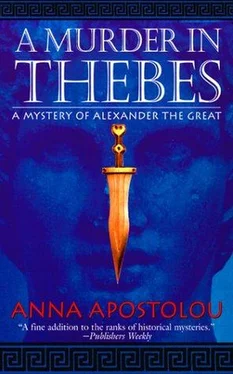Paul Doherty - A Murder in Thebes
Здесь есть возможность читать онлайн «Paul Doherty - A Murder in Thebes» весь текст электронной книги совершенно бесплатно (целиком полную версию без сокращений). В некоторых случаях можно слушать аудио, скачать через торрент в формате fb2 и присутствует краткое содержание. Год выпуска: 2013, ISBN: 2013, Издательство: Headline, Жанр: Исторический детектив, на английском языке. Описание произведения, (предисловие) а так же отзывы посетителей доступны на портале библиотеки ЛибКат.
- Название:A Murder in Thebes
- Автор:
- Издательство:Headline
- Жанр:
- Год:2013
- ISBN:9780755395736
- Рейтинг книги:4 / 5. Голосов: 1
-
Избранное:Добавить в избранное
- Отзывы:
-
Ваша оценка:
- 80
- 1
- 2
- 3
- 4
- 5
A Murder in Thebes: краткое содержание, описание и аннотация
Предлагаем к чтению аннотацию, описание, краткое содержание или предисловие (зависит от того, что написал сам автор книги «A Murder in Thebes»). Если вы не нашли необходимую информацию о книге — напишите в комментариях, мы постараемся отыскать её.
A Murder in Thebes — читать онлайн бесплатно полную книгу (весь текст) целиком
Ниже представлен текст книги, разбитый по страницам. Система сохранения места последней прочитанной страницы, позволяет с удобством читать онлайн бесплатно книгу «A Murder in Thebes», без необходимости каждый раз заново искать на чём Вы остановились. Поставьте закладку, и сможете в любой момент перейти на страницу, на которой закончили чтение.
Интервал:
Закладка:
“There are certain things I cannot tell you, though I’ll be as succinct and as clear as possible. Alcibiades was loyal and so was Lysander.” She waved her hand. “Forget this nonsense about the woman. The Oracle never met Thebans. Disguised as a woman, he met the priestess Antigone. So, if they were seen together in the olive grove, people would simply dismiss them as two priestesses taking a walk. Of course they would meet deep in the grove where no one was supposed to go.”
“Except Lysander,” Demetrius intervened.
“Lysander did go there, and he saw something untoward.” Miriam replied. “But he could make no sense of it. The man he glimpsed disguised as a woman did not have a reputation for such practices. Perhaps Lysander, as a good officer, discussed the matter with Memnon?”
“Yes, he would,” Melitus broke in.
“Memnon, however, had an answer,” Miriam declared. “You see, Antigone was a spy for the Persians. She had recruited an officer here in the citadel. They met secretly. Lysander had noticed this. He may, as I have said, discussed it with Memnon.” Miriam paused. “And this shows the cunning of our spy. Memnon probably told Lysander that the man he’d glimpsed was meeting a spy working for the Macedonians, possibly a priestess who could tell them what was happening in the city. Lysander would have accepted that. However, the Oracle could afford no mistakes. He was probably relieved and pleased that Lysander was later killed by the Thebans.”
“But you told us earlier that one of the Thebans may have betrayed something.”
“No, no.” Miriam shook her head. “I told you to ignore that. The Thebans wanted to kill both Lysander and Memnon so that the garrison here would surrender.” Miriam shrugged. “We all know what happened. Now the Oracle, once Lysander had been removed, tried to unsettle Memnon. First, there was the nonsense about the ghost of Oedipus. That would certainly cause a shiver, a sense of haunting, particularly on a commander who had just lost his loyal lieutenant, a commander who had received rumors that Alexander and the Macedonian army had been destroyed, a commander who was now besieged by Thebans.”
“But Memnon was as tough as a donkey,” Demetrius spoke up.
“Yes, yes he was, but he was also suspicious. He knew there was a spy in the citadel, and his confidant played on these fears, perhaps raising the specter that one of his officers, or all of them, could be involved in such treason.”
“Yes, that was true,” Demetrius said. “Memnon hardly met us.”
“Now the spy was very astute,” Miriam continued. “He offered to be Memnon’s man, to spy on his colleagues. Memnon accepted this. After all, the same man had braved his life in recruiting a so-called spy among the Thebans. Before the siege began, Memnon had allowed this man to disguise himself as a woman in the small garret above his chamber, well away from anyone else’s view.”
Miriam heard a sound outside and stopped. She hoped that Hecaetus had not arrived and, by his blundering, do more harm than good.
“This spy,” she continued, “persuaded Memnon that his officers were going to kill him on a particular night. They would assassinate him in his chamber and hand the citadel over to the Thebans.”
“What proof do you have of this?” Patroclus asked angrily.
“Oh, I have none,” Miriam countered. “But think of Memnon! Frightened about Alexander, grieving over Lysander, realizing he was in charge of a small Macedonian cohort besieged by a powerful city.”
“That was true,” Melitus intervened. “Especially the day before he died.”
“This spy mustn’t have thought much of us,” Patroclus declared languidly.
“Oh, I think he did; that’s why he was so clever; isn’t that right, Cleon?”
All heads turned to where the young officer sat pale-faced, hands clutching the table.
“You are the spy,” Miriam continued quietly.
“But Cleon always claimed he was hated by the Thebans,” Demetrius spluttered. “His family had been killed by them.”
“I couldn’t think of a better reason,” Miriam declared. “Would he worry if Thebes rose in a futile revolt and was destroyed? What did he care about Macedon? He was infatuated with the priestess Antigone, the prospects of limitless wealth, and a life of luxury in Persia. He persuaded Memnon,” Miriam held Cleon’s eyes, “that he could go out and spy among the Thebans disguised as a woman. He was actually given a cloak by his lover, perfume and paints. He used to dress in that garret above Memnon’s chamber where no one else could go. He was seen by Lysander and must have been relieved when the Thebans killed him. He, through Antigone, confirmed the rumors that Alexander of Macedon was dead. He was the candle flame that lit the oil and made it flare further. He didn’t care if Macedon was defeated or Thebes destroyed: either way he would be victorious.”
Cleon just stared rigidly ahead.
“Before the siege,” Miriam continued, pointing at him, “he had Memnon’s permission to slip out of the citadel in disguise. Once the siege began, he’d certainly support Memnon’s decision to send Lysander to deal with the Thebans. After Lysander’s death, whenever this tower was deserted, Cleon would pretend to be the ghost of Oedipus while his lover played a similar role beyond the palisade.”
“And he would communicate with her by arrow?” Melitus asked.
“Yes, Cleon would fire the occasional arrow, marking the spot for his lover to collect the message, though, I suspect,” Miriam smiled thinly, “that they didn’t need to tell each other very much. Perhaps the fire arrows were simply a diversion, another means to unsettle Memnon and the garrison. Now, Cleon,” she continued, “serpentlike, began to talk to Memnon, reassure him of his loyalty, warn him of plots among you officers. In this he was successful. Memnon would trust Cleon, a man who had good reason to hate Thebes. On the night Memnon was killed, Cleon told him some fable, that you were about to storm his room, kill him, and surrender the Cadmea to the Thebans.”
“But we were guarding his room!” Demetrius exclaimed.
“Cleon would only use that to heighten Memnon’s suspicions. He persuaded his commander to leave his chamber and climb a rope to the top of the tower so that when the mutineers broke down the door there would be no one there. Cleon would use such a story to unmask the traitors as well as to protect his captain.”
“You mean,” Patroclus intervened, “Cleon had persuaded Memnon that on that particular night we were going to kill him?”
“Of course. You can only feed uncertainty for so long. If nothing happened, Memnon’s suspicions might shift. Moreover, if Memnon was killed, there was always a chance that the rest of you might lose your nerve and surrender the Cadmea. Cleon lowered a rope from the top of the tower. Memnon, in full armor, left his chamber by the window. However, when he reached the top, Cleon struck him, sending him spinning down to the yard below. The rope was removed and Cleon hid until the following morning when everyone clustered outside Memnon’s room, wondering what had happened.”
“But we were on guard,” Demetrius declared. “We would have noticed Cleon going up and coming down.”
Miriam shook her head. “You told me Memnon could not abide anyone using the garret above him. But that night, as on those days before the siege when Cleon used to disguise himself as a woman, Cleon had Memnon’s permission to be there.”
“True,” Melitus declared. He wagged a finger at Cleon. “Your quarters were not in the tower. No one paid much attention to your comings and goings. You answered to Memnon for what you did.”
“Is she safe?” Cleon abruptly asked. He leaned forward. “Is she hurt?”
Читать дальшеИнтервал:
Закладка:
Похожие книги на «A Murder in Thebes»
Представляем Вашему вниманию похожие книги на «A Murder in Thebes» списком для выбора. Мы отобрали схожую по названию и смыслу литературу в надежде предоставить читателям больше вариантов отыскать новые, интересные, ещё непрочитанные произведения.
Обсуждение, отзывы о книге «A Murder in Thebes» и просто собственные мнения читателей. Оставьте ваши комментарии, напишите, что Вы думаете о произведении, его смысле или главных героях. Укажите что конкретно понравилось, а что нет, и почему Вы так считаете.












